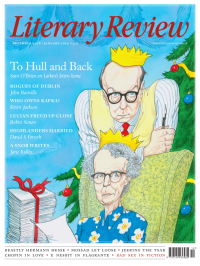Laura Freeman
Reading Between the Brushstrokes
Books Do Furnish a Painting
By Jamie Camplin & Maria Ranauro
Thames & Hudson 256pp £24.95
Man’s best friend: dog or book? The artist Samuel Palmer thought that when it came to walks in the countryside, the company of his ‘not unbeloved bull terrier’ was pleasant. But a book was better, for ‘Milton never fidgeted, frightened horses, ran after sheep, or got run over by a goods-van’.
In François Boucher’s life-size portrait of Madame de Pompadour (1756), a spaniel keens at the royal mistress’s feet. In her lap, a work of philosophy. Or perhaps a naughty novel. In Pierre-Antoine Baudouin’s painting La Lecture (c 1760) we meet another rococo reader, this one reclining in her armchair, her tales of seduction abandoned, her hand lost in the folds of her skirts. A book could be a lover as well as a friend.
These works by Boucher and Baudouin appear in the sumptuous Books Do Furnish a Painting by historian Jamie Camplin and picture researcher Maria Ranauro. Together they have produced a gorgeously illustrated series of essays and musings about paintings inspired by books and books inspired by paintings. Buy six copies for the Palmers and Pompadours in your life and declare your Christmas shopping done.
Camplin takes us from the earliest Christian codices, through St Jerome, Gutenberg and Clarissa, to the books collected by Gilbert & George. Early religious books written on parchment or vellum were expensive. In the ninth century a book of sermons by the German Benedictine monk Haimo of Halberstadt was

Sign Up to our newsletter
Receive free articles, highlights from the archive, news, details of prizes, and much more.@Lit_Review
Follow Literary Review on Twitter
Twitter Feed
It wasn’t until 1825 that Pepys’s diary became available for the first time. How it was eventually decrypted and published is a story of subterfuge and duplicity.
Kate Loveman tells the tale.
Kate Loveman - Publishing Pepys
Kate Loveman: Publishing Pepys
literaryreview.co.uk
Arthur Christopher Benson was a pillar of the Edwardian establishment. He was supremely well connected. As his newly published diaries reveal, he was also riotously indiscreet.
Piers Brendon compares Benson’s journals to others from the 20th century.
Piers Brendon - Land of Dopes & Tories
Piers Brendon: Land of Dopes & Tories - The Benson Diaries: Selections from the Diary of Arthur Christopher Benson by Eamon Duffy & Ronald Hyam (edd)
literaryreview.co.uk
Of the siblings Gwen and Augustus John, it is Augustus who has commanded most attention from collectors and connoisseurs.
Was he really the finer artist, asks Tanya Harrod, or is it time Gwen emerged from her brother’s shadow?
Tanya Harrod - Cut from the Same Canvas
Tanya Harrod: Cut from the Same Canvas - Artists, Siblings, Visionaries: The Lives and Loves of Gwen and Augustus John by Judith Mackrell
literaryreview.co.uk